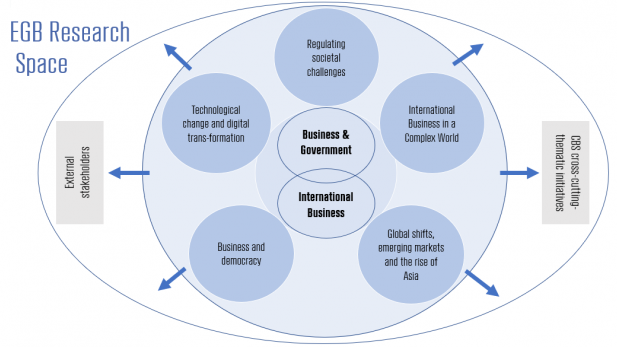Societal Challenges
Illustration Societal Challenges

Many EGB research projects are, directly or indirectly, linked with one or more societal challenge(s). We are particularly committed to five challenges to which EGB research projects relate (see illustration above). Societal challenges are inherently dynamic and evolving over time. As such, the particular challenges addressed at the department may change over time.
EGB is well positioned to address the outlined societal challenges due to the department’s disciplinary roots and principal focus areas. We adopt research projects in different disciplinary principal focus areas to societal challenges. This clarifies (i) how EGB research contributes to major societal challenges; (ii) how EGB can participate in cross-departmental, cross-cutting initiatives, or local initiatives supported by CBS; and (iii) what EGB research has to offer in terms of interaction with relevant external stakeholders and wider society.
EGB research contributions on selected societal challenges
(1) Business and democracy
Research on Business and Democracy advances our understanding of challenges facing democratic and non-democratic governments. Research within this theme draws upon theory and methods in political science, political economy and international business to explore the ways in which democratic and non-democratic governments influence – and are shaped by – the public, businesses, markets, and public policy at the domestic and international level. Current and future research focuses on a number of related issues: (1) The firm in politics and the role of money in politics, including firms’ non-market strategies, political connections, and corruption, and the role of political and economic elites; (2) political risk and the role of the political environment for the investments and strategies of multinational corporations; (3) redistributive and regulatory politics, including the importance of democracy and state capacity for voters, firms, and markets; (4) causes and consequences of inequality; (5) social data science and its use for studying challenges to democracy; (6) government responses to economic and societal crises, including the rise of anti-globalization sentiments, violent conflict, and FDI.
(2) Technological change and digital transformation
Technological change – and in one of its latest incarnations, “digitalization” - is a force that affects how we lead our individual personal and professional lives, how firms compete nationally and internationally, how industries change, and how society evolves. At EGB, we especially consider the international impact technological change has on business, government and economics, coalescing previously distant themes such as: (1) Artificial Intelligence, both as a facilitator and as a driver of corporate and societal change; (2) Industry 4.0, with all its implications for business value chains, industrial clustering, and labor transformation; (3) Global Innovation, covering aspects of skilled labor migration, reverse innovation, and relocation/recentralization of innovation; (4) e-Government, international regulation, and - in the context of cultural diversity - the impact of technological change on ethics and perception of fairness. Multiple research methodologies are being used, with ongoing collaborations both inside and beyond CBS. EGB concentrates its contribution to these themes at the levels of the firm, country, technological trends, and corresponding interactions.
(3) Regulating societal challenges
Increasingly, ‘wicked’ policy problems have a cross-border and transnational dimension that affect governments, but also businesses and other societal stakeholders. This poses challenges and opportunities for regulators (where there is increased coordination at international and EU levels, but where most regulatory authority remains in national contexts), but also businesses and civil society organizations, that may intervene in setting agendas, lobbying and intervening in cross-border challenges. In this group, the aim is to do public events on a biannual basis – round tables – involving governments, regulators, interest organisations, academics, and ideally students that have done interesting master or PhD theses on these topics.
(4) International Business in a Complex World
The ‘International Business in a Complex World’ cluster focuses on internationally active firms and multinational enterprises. We address questions on how internationally active firms handle contemporary challenges through their organizational structures, strategies, and processes. These firms face multiple global pressures, including external stakeholder pressures that differ across home and host countries and pressures to align with national and global ethical standards, as well as a variety of different institutional frameworks. We are particularly interested in the interaction effects of these pressures leading to tensions within the internationally active firms or MNEs (e.g., between headquarters and subsidiaries or within members of global value chains). Among many others, this cluster addresses themes such as firm location choice, FDI, trade, IGOs, NGOs, value chains, outsourcing, tax havens, corruption, inequality, misconduct, responsible management, CEO and Boards, sustainability and humanitarian aid.
(5) Global shifts, emerging markets and the rise of Asia
The cluster brings together members of EGB who study global trading relations, patterns of governance and investment flows upon international business. Within this context it will pay particular attention to the character of development in east and south Asian markets and the challenges posed by globalizing and deglobalizing forces but also consider business strategies, market processes, the role of the state and policy development more broadly.